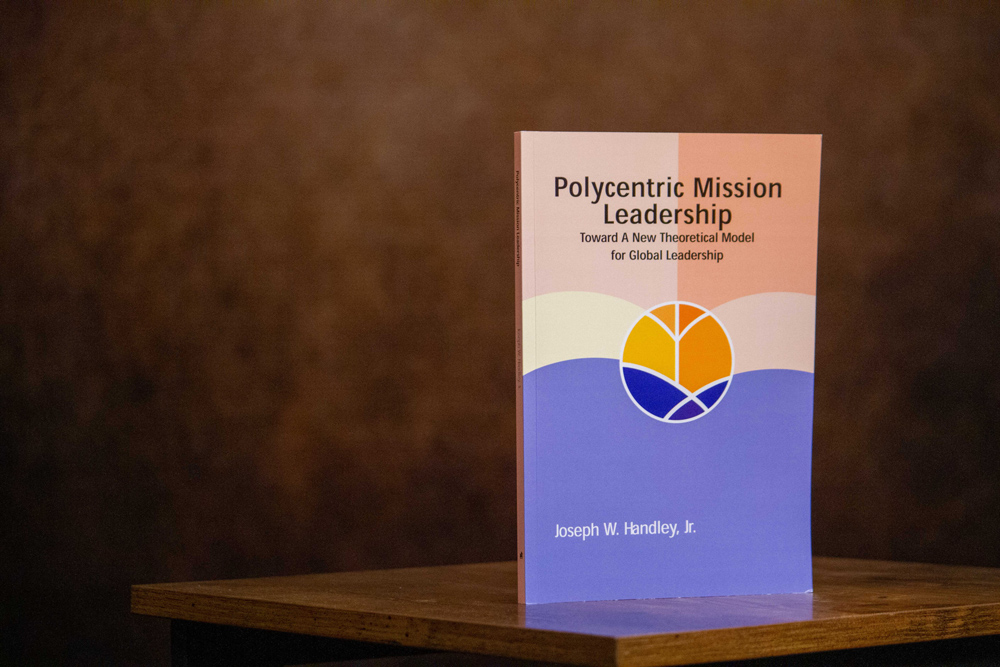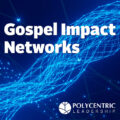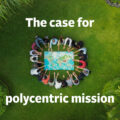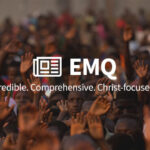
Leader’s Edge: Leadership
MissioNexus Book Review • December 5, 2022
Polycentric Mission Leadership: Toward A New Theoretical Model for Global Leadership
By Joseph W. Handley Jr.
Regnum Books International, 2022 (191 pages)
Find it on Amazon (kindle) • (paperback)
Summary
This book, by an author who has devoted his adult life to Christian missions, offers a “new” model for mission leadership for the multi-cultural enterprise that is Christianity in the world today. He offers the insight that given the cultural diversity of Christian leaders around the world, we must embrace a more collaborative, decentralized approach to leading, an approach that is as given to community and listening as it is to offering vision. The spirit of this leadership is defined in this quote: “Leadership communities in the image of the Trinity embrace a level of mutuality, reciprocal acknowledgement of each other’s gifts, vulnerability to one another, and genuine shared life that transcends simply getting the job done.” Kindle location 646
Best Illustration
“For Wycliffe, moving toward polycentrism has been positive. They have empowered previously unheard voices, given platforms to countries and regions that were formerly on the margins, gained further perspective from various centers of influence into the movement overall, and brought a dynamic sense of spiritual vitality and further missionary expansion.” Kindle location 962
“Another model that uses a polycentric approach is the movement I (the author) have the privilege of leading. Asian Access still had an official operating structure with a governing board, president, and typical flow chart; however, we have adapted the distribution of our leadership using a polycentric model of leadership to foster collaboration, participation, freedom, and diverse perspectives. We envision ourselves more as a community than an organization, as our vision states: ‘a vibrant community of servant leaders … leading the church across Asia.’” Kindle location 1,632
Best Idea
“Instead of the centralized or “statist” approach people often associate with corporate CEOs, I envision a model of leadership that is polycentric – leadership that is collaborative, taking input from a rich diversity of sources in order to achieve better and more representative outcomes than the traditional top-down hierarchical or managerial approach to leadership that has been prevalent for decades.” Kindle location 245
“Over and above collaboration, decentralized (polycentric) leadership allows for each region of the world and every sector of a company to make decisions that are just in time and appropriate for the local context. In this way, agency is empowered through different centers, allowing better choices to be made that are relevant to the local situation.” Kindle location 248
Best Take Away
“I identify six key themes that characterize strong polycentric leadership. Leadership must be collaborative, communal, diverse, allow for entrepreneurial freedom, be relational, and be charismatic.” Kindle location 282
“Through polycentrism, there is a movement to lessen the potential autocratic effects of established centres of power, in terms of structure and centralisation in the midst of decentralisation, by means of a bottom-up approach with some degree of control. The results are: (1) one leads from among and with others; (2) one leads from creatively learning together in community and to attentiveness to the others in the community; and (3) one leads within the margins of the global church.” Kindle location 300
Our Recommendation
This book offers an interesting and helpful approach to advancing the kingdom given the complexities of the Body of Christ worldwide. The author draws from extensive interviews with leaders of the Lausanne Movement and from an analysis of the movement’s organizational culture as a useful example of the leadership style that he is advocating.
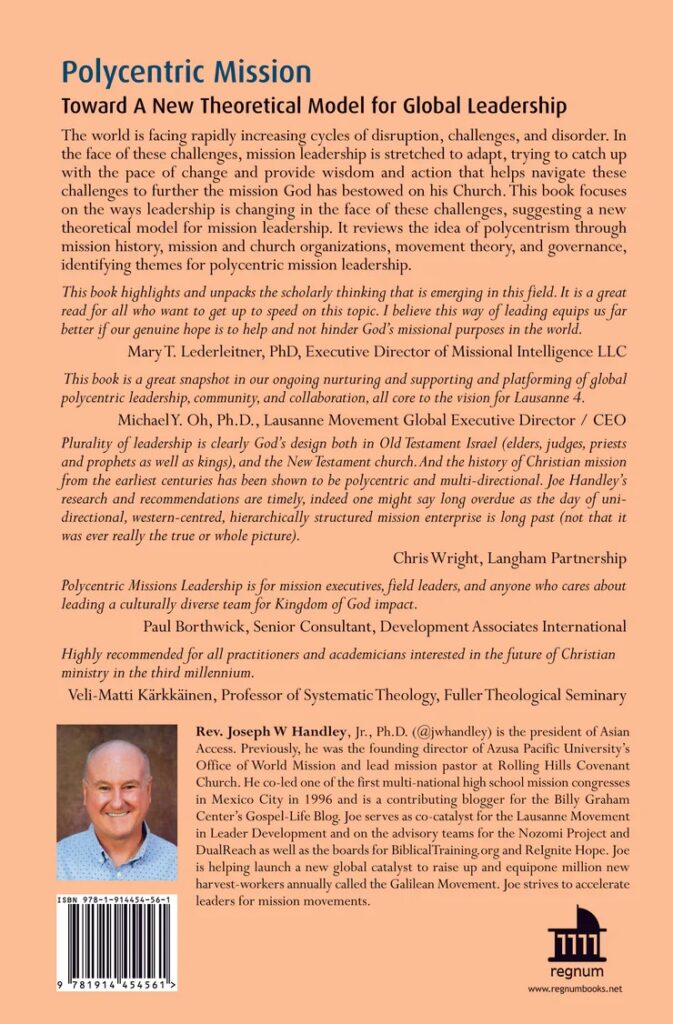
Best Quotes
“My mission journey began with watching my parents provide leadership in our home, church, business, and on short-term mission trips.” Kindle location 156
“My colleagues at Asian Access have shaped my proposed Polycentric Mission Leadership model and approach like no other.” Kindle location 192
“We live in a time of unrivaled global complexity. Political upheavals are occurring in several countries, and ongoing warfare continues unabated.” Kindle location 211
“Sherwood Lingenfelter, an anthropologist and former provost at Fuller Seminary, identified a core ingredient to leadership in this new century: ‘The complexity of leading cross-culturally lies in the challenge of building a community of trust among people who come from two or more cultural traditions.’” Kindle location 218
“The world is experiencing more cross-national and intercultural interaction in the fields of commerce, government, education, and faith traditions than at any point in history.” Kindle location 223
“Given the chaotic, rapidly changing pace of the modern world, flexible, contextually appropriate models of leadership are essential.” Kindle location 233
“My goal is to find a better approach to leadership in a world where everything – from supply chains to political conflict to the church – is global.” Kindle location 242
“I am proposing what I hope is a useful new model for leadership.” Kindle location 244
“My assessment of the influence of the polycentric model was done primarily in the context of the Lausanne Movement. The movement began when charismatic leader Billy Graham partnered with John Stott, a reflective practitioner, and Jack Dain, a strategic coordinator.” Kindle location 258
“My study of polycentric leadership that I lay out in the following pages will analyze these dynamics and establish the contours of a polycentric model of leadership emerging in the present era of mission.” Kindle location 267
“In Chapter 2, I provide an overview of the recent work on polycentrism in other fields. In Chapter 3, I look at models of leadership in a secular context to bolster the case for a polycentric model. In Chapter 4, I reveal the theoretical model of Polycentric Mission Leadership. I move on to the evaluation phase of my research in Chapter 5. I conclude in Chapter 6 by reviewing the theoretical concept of Polycentric Mission Leadership and pointing to strengths and weaknesses that require further study.” Kindle location 269-287
“I see polycentrism as a model that allows for a diversity of ideas and perspectives to interact with one another.” Kindle location 315
“Allen Yeh presented a plausible case for why mission has become polycentric in nature over the last 100 years.” Kindle location 383
“Yeh begins with the familiar point that, ‘A century ago, mission was unilateral and unidirectional from the West to the rest. Today, in light of the phenomenon known as World Christianity, mission is polycentric and polydirectional: from everyone to everywhere.’” Kindle location 463
“As Yeh reviewed the events between 1910 and 2010, one of the common themes he identified is that Christianity has become a truly global religion: ‘Christianity is the only religion in the world that does not have a geographic center or an ethnic majority. World Christianity validates Christianity much more than a Western-only Christianity does. If there is a real God, it makes sense he would be a global God.’” Kindle location 472
“Yeh later writes, ‘Diversity keeps us sharp as we engage with other Christian points of view, but it also keeps us humble if we truly listen to others who may correct any errors in our thinking.’” Kindle location 489
“In 1910, there was one congress and one hero who led the way. In today’s modern, multipolar world, no one central event, leader, network, or movement can capture the whole picture. Yeh argues that we are now in an era of polycentrism.” Kindle location 548
“The questions flowing from these studies become: ‘In what ways does today’s mission leader need to act differently than in eras past?’ and ‘How do the highly varied contexts for mission require new forms of polycentric leadership?’” Kindle location 581
“Success for mission leaders hinges on dependence on God the Father, Jesus the Son, and the Holy Spirit. It is in this Trinitarian relationship that a polycentric model draws significance. God the Father sends the Son and Holy Spirit to lead using their own unique giftedness. Together, they form a triad of leadership operating in unity through their diversity. It is in this style that leaders draw their strength and wisdom, knowing that only in being connected to the vine will we bear fruit. Leonardo Boff suggests, ‘The Trinitarian vision produces a vision of a church that is more communion than hierarchy, more service than power, more circular than pyramidal, more loving embrace than bending the knee before authority.’” Kindle location 605
“Trinitarian leadership is mutual, vulnerable, joyful, and loving, a dance at once mysterious and filled with purpose. Moreover, it is genuinely participatory: we partner with God in his ongoing mission in the world.” Kindle location 627
“The God who bestows his image upon creation is not an isolated individual, but rather exists communally.” Kindle location 638
“Cultivating a community in the image of the divine community – a community of reconciliation, interdependence, mutuality, difference, and openness – becomes central to leadership in a Trinitarian perspective. This includes both the community of leaders and the community led by the leaders.” Kindle location 647
“The very nature of God, being Trinitarian, is an example of polycentric leadership: three distinct Persons leading based on their nature as one.” Kindle location 898
“From the writings on church and mission structures, a number of themes arise. These include communal and collective focus, coordinated activity, empowerment, collaborative effort through teamwork, and the importance of diverse streams of input (similar to the Ephesians 5 gifts as well as multiple centers of influence).” Kindle location 972
“Charismatic/Value-Based leadership includes the conventional attributes of vision, inspiration, and self-sacrifice. However, it goes beyond these attributes and includes three other important dimensions: integrity, decisiveness, and performance orientation.” Kindle location 1,077
“Of the six attributes in the GLOBE study, ‘It is clear … that across the countries in our sample, leaders are generally expected to be Charismatic, Team-Oriented, Participative, and somewhat Humane-Oriented. They are not expected to be Autonomous or Self-Protective.’” Kindle location 1,113
“Theodore (Ted) Esler highlights the work of John L. Campbell in developing a ‘bricolage’ (coalition) as a fresh way to form cooperatives. Bricolages bring disparate forces together in ways that form new social activities. The coalition pools resources and coordinates plans, while keeping distinct organizational identities.” Kindle location 1,191
“Communal collaboration through relational networks operating in entrepreneurial frameworks and inspired by character-based charismatic leaders form many of the themes outlined in this polycentric theoretical model.” Kindle location 1,238
“Collaboration is a central theme that is supported throughout the literature on polycentrism. Whether it is the theological collaboration of the perichoresis of the Trinity, or collective and collaborative practices from governance models of church and mission structures, working together in a shared participative manner is necessary for effective global leadership.” Kindle location 1,437
“A third theme for Polycentric Mission Leadership is a communal approach to leadership. The Trinity is the embodiment of a community between the Father, Son, and Holy Spirit. The literature on polycentric structures values interconnected communities and leadership in community as highlighted by the Wycliffe Global Alliance.” Kindle location 1,451
“A sixth theme is diversity. Leaders who value and recognize diversity are able to work within regions, networks, and governance models, leading across cultures, as the GLOBE study reported.” Kindle location 1,485
“While Polycentric Mission Leadership is considered an emerging paradigm for leadership, there is as yet insufficient research data (both qualitative and quantitative) to fully evaluate its effectiveness. However, my research reveals that a polycentric leadership approach has promise and deserves further attention.” Kindle location 1,497-99
“Because the idea of polycentric leadership is new, there is not enough empirical evidence to test it as a theory. That said, just as critiques are being offered for other emergent ideas, this new approach is being reviewed and tested.” Kindle location 1,573
“J.R. Woodward presents a polycentric model in his book Creating a Missional Culture. He builds the model on an equipping paradigm based on Ephesians 4. His model identifies the apostle, prophet, evangelist, prophet, and teacher, which he describes as a storyteller, as equippers of the church who function based on their giftedness. Woodward describes this model as a shift from a hierarchical model to a polycentric approach, where the equippers empower others to foster the mission of the church.” Kindle location 1,598
“In laying out the model, Woodward shares how the equipping team leads like geese in flight, who share the leadership load and take turns based on their giftings. In describing the relational dimension of the team, he offers the Trinity as a model, which ‘is interdependent, communal, relational, participatory, self-surrendering and self-giving. This is how the equippers should lead. In addition, it is important for the equippers to have mutual respect for one another, appreciating the gifting and experience of each person, giving weight to each.’ Kindle location 1,607
“He then suggests using this communal approach to decision-making, which relies on the group rather than an individual point of view. This creates a participatory element of leadership and a decentralized approach that informs how the church leaders capture vision, which should actually come from the Spirit’s leading rather than their own initiative.” Kindle location 1,611
“Woodward refers to the functioning of a Quaker congregation to describe how his model works.” Kindle location 1,614
More Information
- This book review was republished with permission from MissioNexus and first appeared on December 5, 2022 here: https://missionexus.org/polycentric-mission-leadership-handleyjr/
- Listen to the MissioNexus interview with the author here
